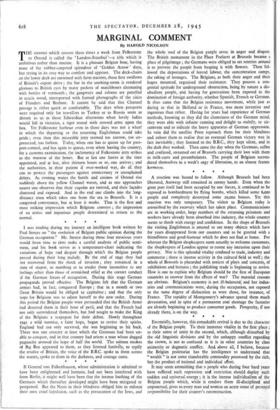I was reading during my journey an intelligent book written
by Paul Struye on " the evolution of Belgian public opinion during the German occupation." Mr. Struye during those four atrocious years would from time to time make a careful analysis of public senti- ment, and his book serves as a temperature-chart indicating the variations of hope and despair through which the Belgian people passed during their long malady. By the end of 1940 they had not recovered from the shock of invasion ; they remained, in a state of stupor, so numbing as to render them insensitive to any feelings other than those of astonished relief at the correct conduct of the German forces of occupation. During this stage German propaganda proved effective. The Belgians felt that the German armies had, in fact, conquered Europe ; that in a month or two Great Britain would be obliged to capitulate ; and that the only hope for Belgium was to adjust herself to the new order. During this period the Belgian people were persuaded that the British Army had deserted them in their hour of peril, and that the French had not only surrendered themselves, but had sought to make the King of the Belgians a scapegoat for their defeat. Slowly throughout 1941 a wild surmise, a faint hope, began to revive their spirits. England had not only survived, she was beginning •to hit back. There was one country at least which the Germans had been un- able to conquer, and in that country had arisen a man whose dogged pugnacity aroused the hope of half the world. The solemn strokes of Big Ben appeared to them, as they listened furtively, to typify the resolve of Britain, the voice of the B.B.C. spoke to them across the waters, spoke to them in the darkness, and courage came.






























 Previous page
Previous page